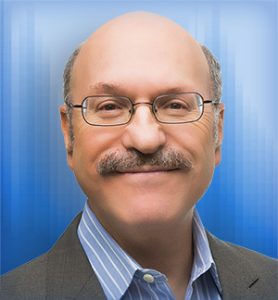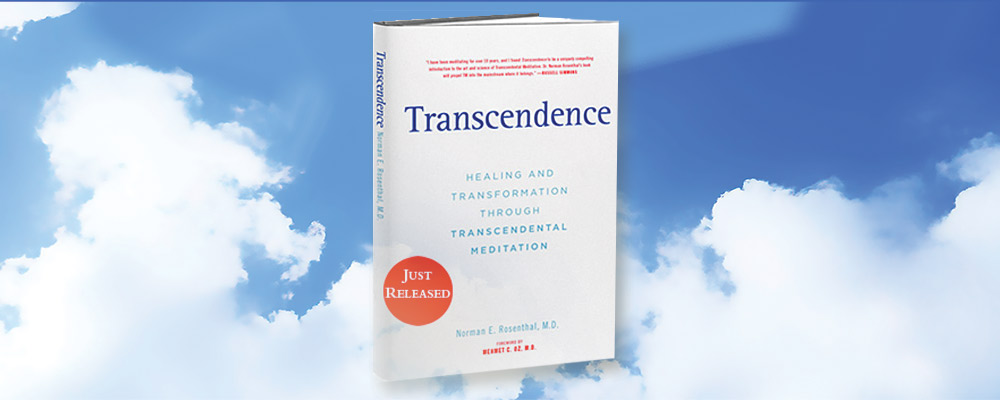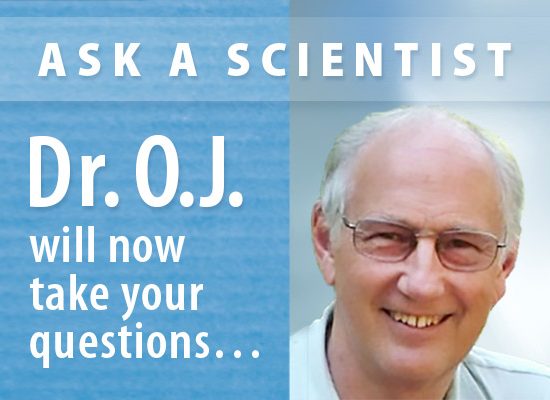Norman Rosenthal, M.D., is a clinical professor of psychiatry at Georgetown Medical School and was the first psychiatrist to describe and diagnose Seasonal Affective Disorder (SAD). He is a former Senior Researcher at the NIH and author of The New York Times best-seller Transcendence: Healing and Transformation through Transcendental Meditation.
In this interview, Dr. Rosenthal talks about how the experience of transcendence during the practice of TM can help eliminate the buildup of stress in our bodies, improve health, and enrich our relationships.
Rolf Erickson: From your experience as a therapist, how do you see stress impacting our health today?
 Dr. Norman Rosenthal: I think a lot of the impact of stress comes from small stresses that accumulate. It’s a little bit like Gulliver when he went to Lilliput, and woke up to find that he was tethered down to the ground by thousands of thin little cords. That’s a wonderful image for the many, many little stresses that, individually, aren’t that much, but, cumulatively, can have a major impact on our health. After a while, it’s hard to know what are the big stresses and what are the little stresses. You start reacting to everything.
Dr. Norman Rosenthal: I think a lot of the impact of stress comes from small stresses that accumulate. It’s a little bit like Gulliver when he went to Lilliput, and woke up to find that he was tethered down to the ground by thousands of thin little cords. That’s a wonderful image for the many, many little stresses that, individually, aren’t that much, but, cumulatively, can have a major impact on our health. After a while, it’s hard to know what are the big stresses and what are the little stresses. You start reacting to everything.
For example, let’s consider time stress. If you’ve got to do a lot of little things in a very compressed time frame, then trying to get it all done can be very stressful. It’s like the old Charlie Chaplin movie “Modern Times” where the conveyor belt that he’s working on starts moving faster and faster. When things go faster and faster for us, then we feel under more and more pressure.
And it’s not just that you react psychologically, but your physiology also reacts, and your blood pressure begins to rise. You start doing unhealthy things in an attempt to control stress, such as overeating or smoking. What’s really needed is to slow down, but that’s not something that can just be done by decree.
All those little tiny stresses don’t need to be responded to or reacted to. [TM practice] enables us to respond only when we need to, and to the right degree, in the right way.
Rolf Erickson: How can the TM technique help us slow down?
Dr. Rosenthal: When you learn TM and meditate for 20 minutes twice a day, everything begins to slow down, at first, just while we’re meditating. But after a while, it spills over into daily life. And as we slow down, we become more effective and more efficient. All those little tiny stresses don’t need to be responded to or reacted to. That enables us to respond only when we need to, and to the right degree, in the right way.
We let things pass, and we recover more quickly. We don’t sweat the small stuff, and we’re not worn down by all the stresses that hit us. We can choose what we’re going to respond to because we’re not on an automatic reflexive trigger response for every little stress. What I often say is that TM gives you a surge protector to protect you against the surges of stress that occur on a daily basis.
Rolf Erickson: Can you give us an example of this surge protector effect?
Dr. Rosenthal: Two studies come to mind. The first was by David Orme-Johnson. He exposed both TM meditators and non-meditators to loud noises and then measured their galvanic skin response (GSR), which is a part of the fight-or-flight response in the sympathetic nervous system.
He found that in the case of meditators, the GSR went up quickly in response to the stress, and then came down quickly and stayed down. That is ideally how you want to respond to stress. When the stress comes, you want to be able to have your stress response system respond to it, take care of it, and then settle back down to baseline.
People in the control group that did not practice TM had a slower settling down of the stress response. And then, even after settling down, their GSR jumped up a couple of times, which were like false alarm responses to the original stress of the loud noise.
The second study was by Daniel Goleman and Gary Schwartz at Harvard University. They had TM meditators and non-meditators watch a grisly occupational safety film where the actors appeared to undergo horrible injuries. The results of their study reinforced what Orme-Johnson had found. The GSR and heart rate of the meditators settled down more quickly after the video than the control group that was not practicing TM.
So these studies do provide evidence that this surge protector idea has a physiological basis in science. It’s not just that you feel like you have a surge protector, but experimental studies indicate that you actually do.
Rolf Erickson: What are the health benefits of having a surge protector for our body and mind?
Dr. Rosenthal: Research has established that TM has a positive impact on blood pressure. Normally what happens is that when stresses are occurring, your blood pressure goes up with the stresses, and then comes down again. But after a while, if you are being stressed repeatedly and frequently, your blood pressure can go up and stay up.
There have been several controlled studies indicating that there is a highly statistically significant decrease in the blood pressure for those who learn the TM technique. It’s no surprise, therefore, that when you look at hard endpoints, such as heart attacks, stroke, or death, TM brings significant positive results as well.
One study showed a 23 percent reduction in all mortality causes, and a 30 percent reduction in cardiovascular mortality for meditators who had previously been in controlled studies of blood pressure. They looked at death records approximately ten years later, and the TM group had much better longevity than the control group.
Dr. Robert Schneider and colleagues repeated that research with a study of high-risk individuals. He found a 47 percent reduction in death, heart attack, and stroke for those who practiced TM in conjunction with all the standard treatments. No other stress management technique has anywhere close to this amount of hard data in support of its claims to reduce stress.
When you start to meditate, you become calmer, and people begin to react differently to you. They begin to feel more relaxed in your presence.
Rolf Erickson: Can you share with us what you’re working on now?
Dr. Rosenthal: I’m writing a book about how TM is a tool for the development of our human potential. Even though TM is a highly effective stress management tool, its benefits go far beyond that. When you start to meditate, you become calmer, and people begin to react differently to you. They begin to feel more relaxed in your presence. So not only do you become less stressed, you become like a little oasis of positivity.
All kinds of things begin to happen that are more conducive to a smooth life. It’s been called “support of nature,” where the world seems to be cooperating with you. Whereas previously you seemed to encounter resistance, with obstacles on all sides, now things flow more easily. What this means it that TM is actually a tool for the development of higher states of consciousness.
Order your copy of Transcendence here ►





[…] to the Transcendental Meditation® technique three years ago through Dr. Norman Rosenthal’s book Transcendence. It sounded like a simple way to help manage the stress of everyday life, so I got the training and […]